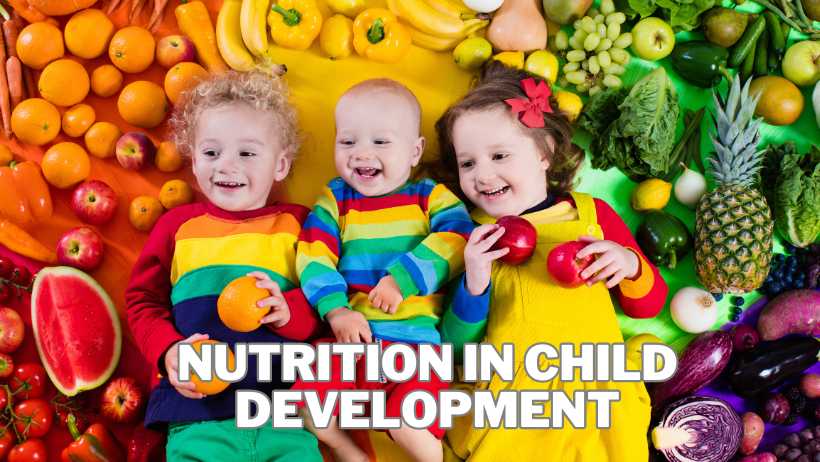
Understand the crucial role of nutrition in child development. Learn how nutrition impacts physical growth, cognitive abilities, and emotional well-being. Discover practical tips for promoting proper nutrition in children. Lay the foundation for a healthy future for your child.
In today’s fast-paced world, providing children with a well-balanced diet can be challenging, especially with the prevalence of processed foods and unhealthy eating habits.
However, understanding the importance of nutrition and making informed choices can have a significant impact on a child’s physical and mental development. From physical growth to cognitive abilities to emotional well-being, nutrition plays a crucial role in all aspects of a child’s overall development.
Ensuring that children receive the necessary nutrients through various foods is vital for their growth and future health. By providing them with a diverse menu of fruits, vegetables, lean proteins, whole grains, and dairy products, parents can help children develop not only muscular bodies and healthy organs but also cognitive abilities and emotional regulation.
With practical tips for promoting proper nutrition, parents can lay the foundation for a healthy future for their children.
The Impact of Nutrition on Physical Growth and Development
Proper nutrition is crucial for the physical growth and development of children. The nutrients they receive from their diet directly affect their height, weight, bone density, and muscle mass. In order to support optimal physical growth, it is important to provide children with a well-balanced diet that is rich in proteins, carbohydrates, healthy fats, vitamins, and minerals.
Proteins play a vital role in physical development as they are the building blocks of the body. They are responsible for the development of muscles, tissues, and organs. Including protein-rich foods such as lean meats, eggs, and legumes in a child’s diet is essential for their muscular development.
Carbohydrates are another important nutrient that contributes to physical growth. They provide the energy needed for physical activities and brain function. Whole grains, fruits, and vegetables are all excellent sources of carbohydrates and should be included in a child’s diet.
In addition to proteins and carbohydrates, essential vitamins and minerals are also crucial for physical development. These nutrients support the immune system, help heal wounds, and promote healthy bone development. Including a variety of fruits, vegetables, and dairy products in a child’s diet can ensure they receive the necessary vitamins and minerals for optimal growth.
Overall, providing children with a diverse menu of nutritious foods is essential for their physical growth and development. By fueling their bodies with the necessary nutrients, we are setting them up for a healthy and active lifestyle.
Cognitive Development and Nutrition
Nutrition not only impacts physical development but also plays a significant role in cognitive development. Like our bodies, our brains require specific nutrients to function optimally. Therefore, providing children with a diet that is rich in these nutrients can greatly enhance their learning and brain development.
One key nutrient that is essential for brain health and cognitive development is omega-3 fatty acids. These healthy fats are found in foods such as fish, walnuts, and chia seeds. Including these foods in a child’s diet can improve their memory, attention span, and problem-solving skills.
In addition to omega-3 fatty acids, certain vitamins and minerals are also important for proper brain functioning. B vitamins, iron, and zinc, for example, have been shown to support cognitive abilities. Foods such as leafy greens, eggs, and fortified cereals are excellent sources of these nutrients.
By providing children with a diet that is rich in these brain-boosting nutrients, we can help support their cognitive development and enhance their learning abilities.
Emotional and Social Development and Nutrition
The impact of nutrition goes beyond physical and cognitive development; it also plays a significant role in emotional and social development. Nutrition can affect a child’s behavior and mood regulation, ultimately influencing their overall emotional well-being.
A healthy diet that includes a variety of nutrients can help prevent emotional and behavioral problems in children. Specific nutrients such as omega-3 fatty acids, vitamin D, and magnesium have been shown to support brain health and promote emotional well-being.
Omega-3 fatty acids, found in fatty fish and nuts, have been linked to reduced levels of anxiety and depression in children. Vitamin D, obtained from sunlight and certain foods, is essential for regulating mood and reducing the risk of mental health disorders. Magnesium, found in foods like green leafy vegetables and nuts, plays a role in neurotransmitter function and can help alleviate symptoms of anxiety and mood disorders.
By ensuring that children receive the necessary nutrients for emotional and social development, we can support their overall well-being and help them navigate their emotions more effectively.
Building a Foundation for Future Health
The importance of nutrition extends beyond childhood; it also sets the foundation for long-term well-being and health into adulthood. Research has shown that the eating habits established during childhood can impact an individual’s overall health in the long run.
By providing children with a balanced and nutritious diet, we are not only fueling their growth in the present but also giving them the best chance of a healthy future. A diet rich in fruits, vegetables, whole grains, lean proteins, and healthy fats lays the groundwork for optimal physical health. It can help prevent chronic diseases such as obesity, diabetes, and cardiovascular problems later in life.
Additionally, developing healthy eating habits during childhood can lead to a positive relationship with food and an understanding of the importance of nutrition. By instilling these habits early on, we are setting children up for a lifetime of healthy choices and long-term well-being.
Practical Tips for Promoting Proper Nutrition in Children
Promoting proper nutrition in children can sometimes be challenging, especially with busy schedules and the prevalence of unhealthy eating habits. However, there are practical tips that parents can follow to ensure their children are receiving the necessary nutrients for optimal growth and development.
- Lead by example: Children learn by observing their parents and caregivers. Set a good example by making healthy food choices and emphasizing the importance of nutrition. Show them that nutritious foods can be delicious and enjoyable.
- Involve children in meal planning: Encourage your child to participate in meal planning and preparation. Let them choose fruits and vegetables they enjoy, and involve them in grocery shopping and cooking. This can help foster a sense of ownership and autonomy over their food choices.
- Create an enjoyable eating environment: Make mealtime a positive and enjoyable experience by sitting together as a family. Minimize distractions, such as television or electronic devices, and engage in conversation. This can create a pleasant atmosphere and promote healthier eating habits.
- Offer a variety of foods: Introduce your child to a wide range of nutritious foods from an early age. Including different colors, textures, and flavors can make meals exciting and encourage them to try new things. This can also help ensure they receive a diverse range of nutrients.
- Limit sugar and processed foods: Reduce the consumption of sugary drinks, snacks, and processed foods. These foods can contribute to unhealthy weight gain and lead to long-term health problems. Opt for whole, unprocessed foods whenever possible.
By implementing these practical tips, parents can promote proper nutrition in their children and help them develop healthy eating habits that will benefit them throughout life.


















